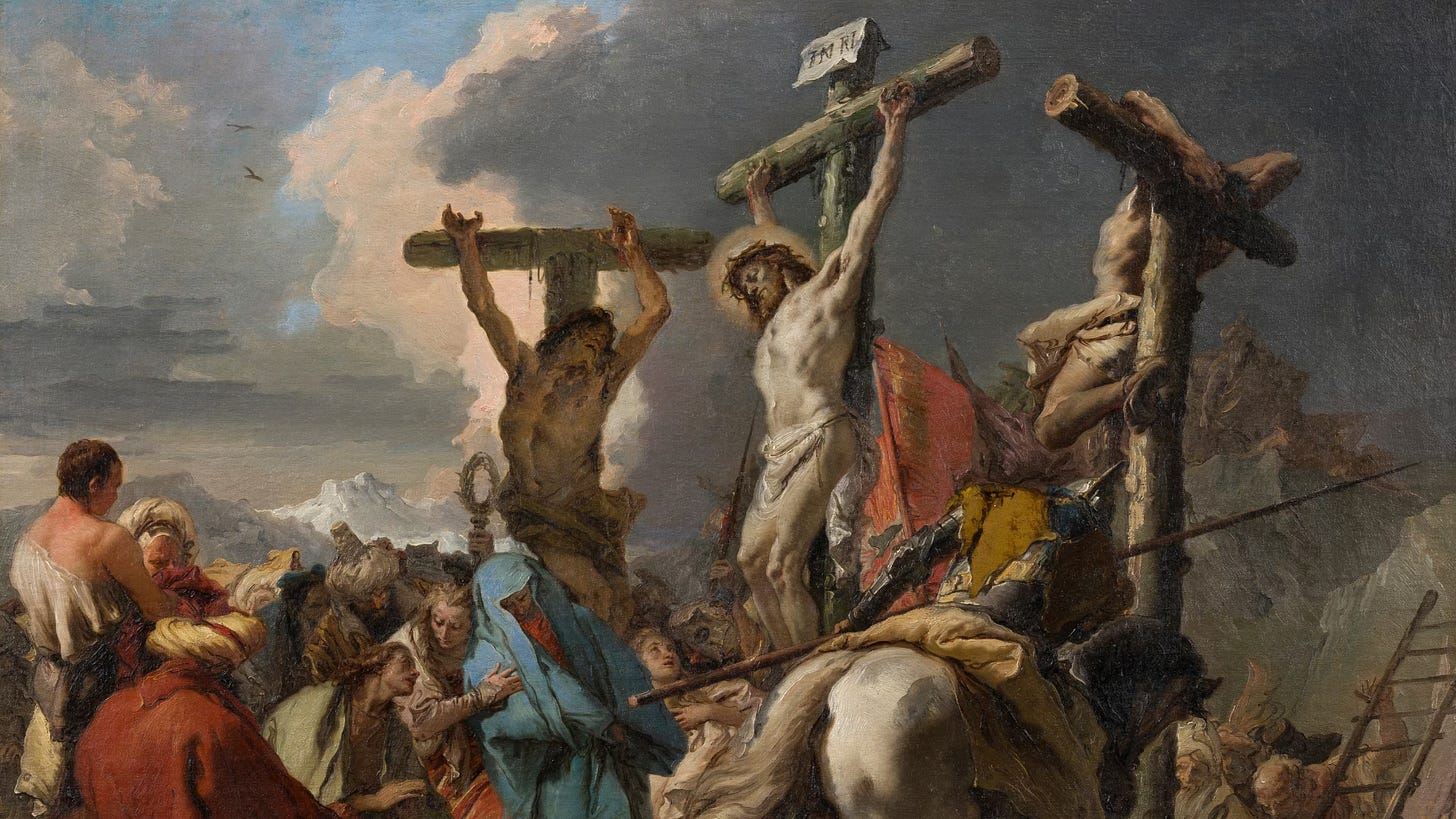Cruciform faith.
Todd Brewer on the beautiful contradiction of a crucified God.

Todd Brewer’s recent essay for Mockingbird Magazine, “Johnny, Take a Walk With the Crucified God” is already one of the best things I have read on the Internet in a while. Without delving into the esoteric or academic, Todd explains the theology of the cross in inspired terms that bring to bear the power, profundity, and paradox of Christ’s cruciform suffering and salvation. “The death of Jesus at Golgotha,” he writes, “introduces an unnatural contradiction: that the Messiah who will forever reign on David’s throne will do so by dying at the hands of Israel’s enemies, that the path to victory runs through defeat.” This, of course, speaks to the apostle Paul’s articulation of the inherent scandal of the “word of the cross” (1 Cor. 1:18). Nothing appears more contradictory than revering a crucified prophet, let alone one who claimed to be God in the flesh. Surprisingly, though, the stigma and shame of the cross didn’t efface his followers. Rather, in the light of the resurrection, it became the lynchpin of their faith. Todd continues:
The shock of Jesus’ death and resurrection generated an epistemological revolution for his earliest followers. The truth of God and the universe was not what they otherwise would have thought it to be. Because however much Jesus’ death, burial, and resurrection on the third day occurred “according to the Scriptures” (1 Cor. 15:3-4), the Christian conviction arose retrospectively — both historically and hermeneutically. Aside from Jesus himself, the idea of a crucified Messiah was unthinkable to both the disciples, their Jewish contemporaries, and the Gentiles. Something new occurred at Calvary, an event whose very strangeness revealed what was hidden from before the foundation of the world . . .
The hiddenness of God in the midst of suffering and death is an affecting demonstration of grace, which always surprises its recipients. Indeed, to “find” the sovereign Creator amid such horrid accoutrements sounds antithetical to divinity. But such is the beautiful enigma of the crucified Christ, that is of the divine yet human Son of God who condescends to the horrors of the cross and assumes the agonies of the human condition as his own in order to “reconcile to himself all things, whether on earth or in heaven, making peace by the blood of his cross” (Col. 1:20). Accordingly, the cross serves as the epitomization of who God is. “To know Christ, is to know the cross,” the beloved Martin Luther says, “and to understand God in the midst of the crucifixion of the flesh: this is design of God, this is the will of God, yea, this is God” (1.148).
Paul’s Corinthian letters are, perhaps, some of the best biblical articulations of discerning God through the paradox of the cross. The folly of such a message seems severely counterintuitive if one aims to procure a following, especially if one’s objective remains redeeming the world from all of its flaws and foibles. Succumbing to weakness, even the weakness of death on a cross leaves human wisdom amply flummoxed. Indeed, the crucified God makes “foolish the wisdom of the world” (1 Cor. 1:20). Consequently, we are made to understand the work of God through no other lens than his Son’s crucifixion and death. “His work upon [his saints] is one thing in appearance,” Luther continues, “but quite a different thing in reality. He seems to kill, but in reality makes alive: he wounds, but in reality heals: he confounds, but at that very time in reality glorifies: he bringeth down to the grave, but at that very time rather brings up from the grave” (1.148). Todd puts it this way:
God, for Paul, is to be found in the horror of the cross. Indeed, God refuses to be seen in any other way except through the cross. What looked like wisdom was really folly. What looked like life was really death. The truth only looks like a lie to those perishing, but “among the mature we do speak wisdom . . . we speak of God’s mysterious, hidden wisdom which God predestined before the ages for our glory” (1 Cor. 2:6–7). What was unknown became known, what was hidden became revealed. Before Paul, the Corinthians, Israel, and even creation itself, there was the wisdom of the cross. Like a prism refracting white light into a glorious rainbow, at Golgotha the mystery of everything was revealed, illuminating all the past, the future, and God himself.
As the rest of the world fractures, leaving individuals to scratch and claw after worldly wisdom, Christ’s church has been entrusted with the cruciform wisdom of the gospel. Accordingly, as humanity’s intelligentsia scrambles to make sense of the times, the church is charged to proclaim the paradoxical hope of the crucified Christ through whom the world is redeemed and remade.
Grace and peace.
Works cited:
Martin Luther, Complete Commentary on the First Twenty-Two Psalms, translated by Henry Cole, Vols. 1–2 (London: Simpkin & Marshall, 1826).


